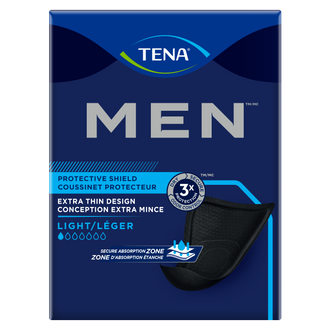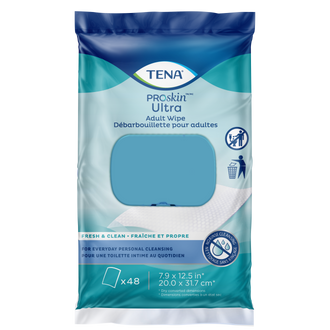"If I had a symptom of any kind, I would seek help for it." Ralph Peeker, Professor and Chief Physician at the Department of Urology, Sahlgrenska University Hospital, Gothenburg
Jun 10, 2024
Is there really a link between the prostate and male incontinence, or is it just a myth? If you're dealing with bladder leaks or simply curious about how the prostate affects urinary health, know that this is a common concern for many men.
The prostate plays a key role in the urinary system, and changes such as enlargement or surgery can sometimes affect bladder control, leading to incontinence.1 In this article, we’ll break down the facts, bust the myths, and explore ways to manage symptoms effectively.
Prostate and Urinary Problems
The prostate may be small, but it has a big job when it comes to urinary health. Sitting just below the bladder, it influences urine flow due to its location.2
Your bladder relies on two valves (sphincters) to keep urine in until you’re ready to go.1 One is internal, and the other is external. When the prostate is removed during surgery, the internal valve is removed as well.1You still have the external valve, and for most men, this is enough to maintain bladder control—as long as the pelvic floor muscles and nerves are working properly.1
Radiation therapy for prostate cancer, on the other hand, can be a little trickier. Radiation can damage healthy tissue around the bladder and sphincter, making it harder for them to function as they should.1 This can lead to leaks or trouble holding urine.
So, while the prostate itself isn’t directly responsible for bladder control, it’s definitely connected to the whole system—which is why prostate issues and treatments can sometimes lead to unexpected urinary challenges.1
Facts on Male Incontinence and Prostate
Let’s get into the facts: the prostate and bladder are closely linked anatomically1, and when prostate issues arise, bladder control can take a hit.
An enlarged prostate gland (benign prostatic hyperplasia or BPH) can affect bladder function, sometimes causing an overactive bladder and leading to incontinence.2 An overactive bladder can also lead to urge incontinence, where urine dribbles out because the bladder muscles contract on their own with little warning or stress incontinence where you leak urine because of stress or pressure on your bladder.1,2
Nerve damage from surgery can also lead to urge incontinence, where sudden, strong urges to go make it hard to hold urine in.1
The good news? Incontinence caused by prostate issues is often temporary, and many men regain control with the right approach—whether that’s pelvic floor exercises, medication, or other medical treatments.1
Fiction About Male Incontinence and Prostate
There’s a lot of misinformation out there about prostate health and incontinence. Let’s bust some of the biggest myths:
“Only older men experience incontinence.”
Not true! While age increases the risk, younger men can also experience bladder leaks due to prostate issues, nerve damage, or other health conditions—it varies from person to person.1,3
“Prostate surgery always leads to permanent incontinence.”
While some men do experience leakage after procedures like a prostatectomy, this is usually temporary.1 With proper recovery, pelvic floor exercises, and medical support, many men regain full bladder control.1
“There’s nothing you can do about it.”
Wrong again. From simple lifestyle changes to non-invasive medical treatments, there are plenty of ways to manage prostate-related incontinence.1,3 The key is talking to a doctor early rather than suffering in silence.
Bottom line? Prostate problems can affect urinary health, but they don’t have to take over your life. With the right information and treatment, bladder control can improve—so don’t believe the myths!
Problems with Enlarged Prostate Gland
Benign prostatic hyperplasia (BPH), or an enlarged prostate, is a common condition that most commonly affects men older than 50.3 The prostate naturally grows over time as an individual ages, but in some cases, it enlarges enough to press against the urethra, making urination more difficult.3
Symptoms of BPH include:
- Frequent urination, especially at night (nocturia)3
- Weak or interrupted urine stream3
- A sudden, urgent need to urinate2
- Difficulty starting urination3
- Incomplete bladder emptying, leading to dribbling1
Treatment options for an enlarged prostate range from lifestyle changes and medication to minimally invasive procedures and surgery.3 Medications can relax prostate muscles, making it easier to go to the bathroom, while procedures can remove excess prostate tissue or widen the urethra so urine flows more easily.3 A healthcare professional may be able to guide you about the best option for your specific needs.
Urinary Incontinence in Men
Male urinary incontinence happens when bladder control isn’t as strong as it should be, leading to unexpected leaks.1 It can happen for a variety of reasons, and prostate issues are often part of the picture.
Types of urinary incontinence in men:
- Stress incontinence – Ever notice a leak when you cough, sneeze, or lift something heavy? This type is common after prostate surgery.1
- Urge incontinence – That sudden, gotta-go-right-now feeling? This can be caused by prostate irritation or nerve damage.1
The good news is, there are ways to manage it. Pelvic floor exercises, bladder training, and medications can help, and in some cases, surgery might be an option. In the meantime, absorbent products like TENA Men Light Shields or TENA Men Maximum Guards offer discreet protection, so leaks don’t have to slow you down.
How Common is Urinary Incontinence in Men?
Experts say that BPH (benign prostatic hyperplasia) becomes more common with age3:
- Under 40: Rarely causes symptoms.3
- Ages 40 to 64: Affects about 5% to 6% of men.3
- Ages 65 and older: Jumps to 29% to 33% of men.3
Your chances of developing BPH go up due to a few factors:
- Age: Risk increases after 40.3
- Family history: Having a close relative with BPH raises your risk.3
- Lifestyle factors: Being overweight or not getting enough exercise can contribute.3
- Health conditions: Diabetes, heart disease, and erectile dysfunction are linked to a higher risk.3
FAQs
What is the best drink to shrink the prostate? While no drink can magically shrink the prostate, certain beverages can support prostate health and may help manage symptoms of an enlarged prostate. Here’s a simple rundown of some drinks that can help support your prostate and urinary health4:
- Water: Staying hydrated isn’t just good for you overall—it also helps flush out toxins and ease urinary symptoms.4
- Green Tea: Packed with antioxidants, green tea can help reduce inflammation and keep your prostate in check.4
- Tomato Juice: The lycopene in tomato juice might help improve prostate function.4
- Citrus Juice: Full of vitamin C and antioxidants, citrus juice may help reduce inflammation.4
So, sipping on these could be a small but helpful step toward better prostate health.4 Limiting caffeine, alcohol, and carbonated drinks can also help reduce bladder irritation and improve urinary symptoms.4
Is incontinence normal after prostate surgery?
Yes, urinary incontinence is a common side effect after prostate surgery, especially after procedures like a prostatectomy (removal of the prostate). This happens because the surgery can temporarily weaken the pelvic floor muscles and affect the nerves that control bladder function.1
Most men experience stress incontinence (leaks when coughing, sneezing, or lifting) after surgery, but this usually improves over time.1 The recovery process varies, and many men regain bladder control within a few months.1
For more on post-surgery incontinence and management strategies, check out this guide.1
Does incontinence go away on its own after prostate surgery?
For most men, yes, incontinence is usually temporary and improves gradually as the body heals.1 The timeline for recovery varies person to person and depends on factors like age, overall health, and the type of surgery performed.1
To speed up recovery, doctors often recommend pelvic floor exercises (like Kegels) to strengthen your pelvic floor muscles, which support healthy bladder and bowel function.1 Using incontinence shields or guards can also provide useful protection during recovery.
Many men regain full bladder control over time, but if stress incontinence persists for more than six months, it’s a good idea to check in with your healthcare provider.1
References
1. Cleveland Clinic. ‘Incontinence after prostate surgery’. 2024. Available from: https://my.clevelandclinic.org/health/symptoms/incontinence-after-prostate-surgery
2. Harvard Health. ‘An enlarged prostate gland and incontinence’. 2019. Available from: https://www.health.harvard.edu/mens-health/an-enlarged-prostate-gland-and-incontinence
3. NIH. ‘Enlarged Prostate (Benign Prostatic Hyperplasia)’. 2024. https://www.niddk.nih.gov/health-information/urologic-diseases/prostate-problems/enlarged-prostate-benign-prostatic-hyperplasia
4. American Prostate Centers. ‘5 Drinks to Avoid with an Enlarged Prostate’. 2024. Available from: https://americanprostatecenters.com/blog/5-drinks-to-avoid-with-an-enlarged-prostate/







